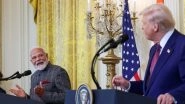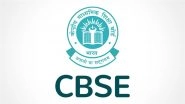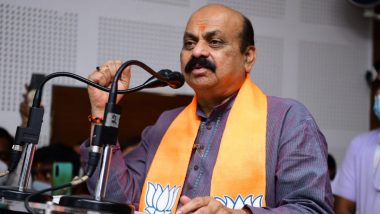Huvinahadagali, October 14: Karnataka Chief Minister Basavaraj Bommai on Thursday said that the final verdict on the hijab row will be important as it would not be restricted to the state but would apply to the whole country.
The Supreme Court on Thursday pronounced a split verdict in the Karnataka Hijab ban case. The two-judge bench of the top court gave divergent views while pronouncing judgement on Hijab issues in educational institutions. Hijab Ban: Supreme Court's Justice Sudhanshu Dhulia Says 'Asking Girls To Take Off Hijab Invasion of Privacy, Attack on Dignity'.
"The final verdict on the hijab row is very important as its impact is not restricted to Karnataka but applies to the whole country. So they have to wait for the final verdict to come," Bommai said while talking to the reporters here. He said the court was seized of the Hijab controversy and two judges of the Supreme Court have given their verdict.
"There were a lot of dimensions for the hijab row. The demand of students is different and the government order is different. Since it involves national and international issues the government is expecting a clear verdict from the court," Bommai said.
Earlier on Thursday, Justice Hemant Gupta held that the essential religious practices of the followers of the Sikh faith cannot be made the basis of wearing the headscarf by the believers of the Islamic faith while Justice Sudhanshu Dhulia said that it may or may not be a matter of essential religious practice, but is a matter of conscience, belief, and expression. Hijab Ban: After Supreme Court's Split Verdict, Karnataka Education Minister BC Nagesh Says 'Hijab To Remain Prohibited in Schools and Colleges'.
A bench of justices Hemant Gupta and Sudhanshu Dhulia pronounced a split judgement on the Hijab issue, as one upheld the Karnataka HC judgement, while the other set it aside.
Justice Gupta, upholding the Karnataka High Court judgement, said, "The essential religious practices of the followers of Sikh faith cannot be made the basis of wearing of hijab/headscarf by the believers of the Islamic faith."
However, Justice Dhulia, who also remarked that what constitutes Essential Religious Practices was left to the doctrine of that religion itself, said that "it may or may not be a matter of essential religious practice, but it still is, a matter of conscience, belief, and expression."
The court was hearing various appeals challenging an order passed by the Full Bench of the Karnataka High Court on March 15, which dismissed the pleas challenging the Government order dated February 5. Karnataka Government Order had directed the Government schools in Karnataka to abide by the prescribed uniform, and the private schools were directed to mandate a uniform as decided by their Board of Management.
(The above story is verified and authored by ANI staff, ANI is South Asia's leading multimedia news agency with over 100 bureaus in India, South Asia and across the globe. ANI brings the latest news on Politics and Current Affairs in India & around the World, Sports, Health, Fitness, Entertainment, & News. The views appearing in the above post do not reflect the opinions of LatestLY)













 Quickly
Quickly


